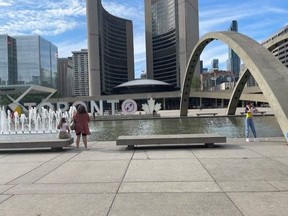
Toronto’s new vacant home tax is about to become a reality, and by Thursday, residents have to let City Hall know about thier domiciles with a declaration of occupancy status.
If you don’t file that document (you can do it online) by deadline, you could face a fine of $250.
From our newsroom to your inbox at noon, the latest headlines, stories, opinion and photos from the Toronto Sun.
Thanks for signing up!
A welcome email is on its way. If you don't see it, please check your junk folder.
The next issue of Your Midday Sun will soon be in your inbox.
Fines for attempting to avoid the tax can be as high as $10,000.
Here’s the deal: If you own a house or condo that’s sitting empty more than six months of the year, you’re going to be taxed for it — at 1% of the assessed value every year in additional taxes.
But few people will actually pay this tax. The city isn’t interested in your principal residence, and they’re not interested in taxing you if said residence is empty while you are on holiday for months.
They’re not going to tax you if your house is currently being rented to someone else, either, or if it’s empty because you’re working overseas or renovating or because the registered owner has died or been put in care.
They would like a tax word with you, however, if you own an empty house or condo that could be put to better use.
All the details and exemptions are on the city of Toronto website. The new tax is designed to increase the housing supply.
As previously reported, the Toronto version is modelled on the Empty Homes Tax in Vancouver which began with a 1% levy in 2017.
It will grow to 5% in 2023. It will be enforced through compliance audits.
Sure enough, the tax has meant some 4,000 additional housing units are now in play in Vancouver.
As Mayor John Tory said when the tax was confirmed in December, “residences are meant for people to live in, not to sit empty during a housing crisis.”
The tax is expected to pull in somewhere between $55 million and $65 million in revenue for Toronto, money the mayor says will be invested in more affordable housing.
Casey Brendon, director of the city’s revenue services deparment, said Tuesday that declarations of occupancy status have been filed now from about 80% of residential property owners.
And, he said, there will be a grace period before anyone gets fined for a late declaration.
“Homeowners who have not submitted a declaration of occupancy status by the Feb. 2 declaration due date are encouraged to submit a late declaration.
“The online portal will continue to accept late declarations, and no immediate fines or penalties will apply to declarations received after the due date.”
You will get a reminder first if you haven’t sent in your declaration by Feb. 2, said Brendon.


